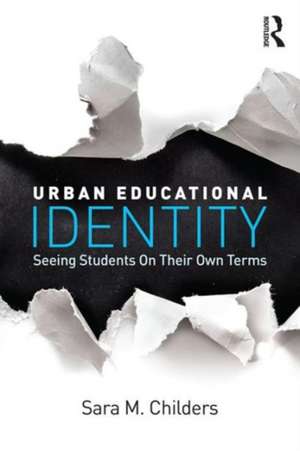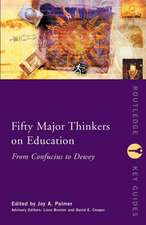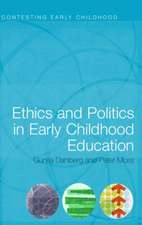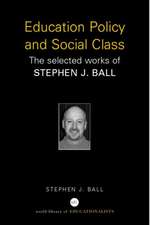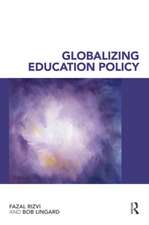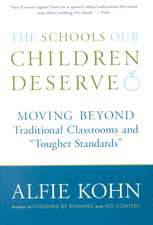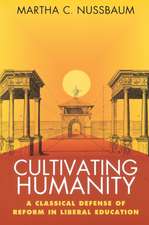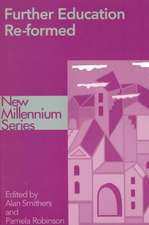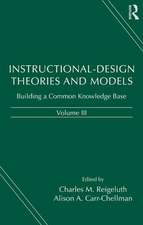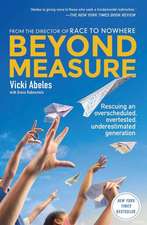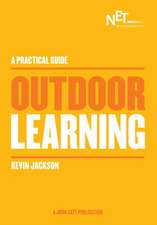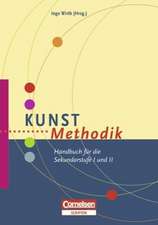Urban Educational Identity: Seeing Students on Their Own Terms: The Critical Educator
Autor Sara M. Childersen Limba Engleză Paperback – 26 sep 2016
WINNER 2017 American Educational Studies Association Critics Choice Award
Through rich ethnographic detail, Urban Educational Identity captures the complexities of urban education by documenting the everyday practices of teaching and learning at a high-achieving, high-poverty school. Drawing on over two years of intensive fieldwork and analysis, author Sara M. Childers shows how students, teachers, and parents work both within and against traditional deficit discourses to demonstrate the challenges and paradoxes of urban schooling. It offers an up-close description of how macro-government policies are interpreted, applied, and even subverted for better or worse by students as active agents in their own education. The book moves on to develop and analyze the concept of "urban cachet," tracing how conceptions of race and class were deeply entwined with the very practices for success that propelled students towards graduation and college entrance. A poignant, insightful, and practical analysis, Urban Educational Identity is a timely exploration of how race and class continue to matter in schools.
| Toate formatele și edițiile | Preț | Express |
|---|---|---|
| Paperback (1) | 345.63 lei 6-8 săpt. | |
| Taylor & Francis – 26 sep 2016 | 345.63 lei 6-8 săpt. | |
| Hardback (1) | 1010.60 lei 6-8 săpt. | |
| Taylor & Francis – 10 oct 2016 | 1010.60 lei 6-8 săpt. |
Preț: 345.63 lei
Nou
Puncte Express: 518
Preț estimativ în valută:
66.14€ • 69.28$ • 54.81£
66.14€ • 69.28$ • 54.81£
Carte tipărită la comandă
Livrare economică 08-22 aprilie
Preluare comenzi: 021 569.72.76
Specificații
ISBN-13: 9781138842922
ISBN-10: 1138842923
Pagini: 144
Ilustrații: 3
Dimensiuni: 152 x 229 x 15 mm
Greutate: 0.2 kg
Ediția:1
Editura: Taylor & Francis
Colecția Routledge
Seria The Critical Educator
Locul publicării:Oxford, United Kingdom
ISBN-10: 1138842923
Pagini: 144
Ilustrații: 3
Dimensiuni: 152 x 229 x 15 mm
Greutate: 0.2 kg
Ediția:1
Editura: Taylor & Francis
Colecția Routledge
Seria The Critical Educator
Locul publicării:Oxford, United Kingdom
Public țintă
PostgraduateCuprins
Acknowledgements
Series Editor Introduction
Chapter 1: Rethinking Urban Education
Vignette: Can I get into Trouble? Negotiating the Terms of Research
Chapter 2: Ohio Magnet School Before and After Brown
Vignette: "See What We Don’t Have:" The Myth of the Boutique School
Chapter 3: "State Standards are the Minimum of What We Do"
Vignette: Winter Formal Assembly
Chapter 4: Excellent Intentions: Racialized Enrollment Practices of a Successful? Urban School
Vignette: International Baccalaureate Theory of Knowledge Course at OMS
Chapter 5: Urban Cachet
Vignette: Mr. Hart’s English and History "Split" Class
Chapter 6: Those Students
Vignette: "He Just Gave Us All the Answers:" Boys Participation in 10th Grade Humanities
Chapter 7: On Their Own Terms
Appendix I: Getting in Trouble
Appendix II: Recommendations
Series Editor Introduction
Chapter 1: Rethinking Urban Education
Vignette: Can I get into Trouble? Negotiating the Terms of Research
Chapter 2: Ohio Magnet School Before and After Brown
Vignette: "See What We Don’t Have:" The Myth of the Boutique School
Chapter 3: "State Standards are the Minimum of What We Do"
Vignette: Winter Formal Assembly
Chapter 4: Excellent Intentions: Racialized Enrollment Practices of a Successful? Urban School
Vignette: International Baccalaureate Theory of Knowledge Course at OMS
Chapter 5: Urban Cachet
Vignette: Mr. Hart’s English and History "Split" Class
Chapter 6: Those Students
Vignette: "He Just Gave Us All the Answers:" Boys Participation in 10th Grade Humanities
Chapter 7: On Their Own Terms
Appendix I: Getting in Trouble
Appendix II: Recommendations
Notă biografică
Sara M. Childers is an independent scholar and assistant director of The Women's Place, the women's policy office at The Ohio State University. She resides in Dublin, Ohio, USA.
Recenzii
“This book is an important contribution to the literature on urban education. It refutes the deficit and pathology-driven orientations so common to studying schools, school reform, and youth from historically marginalized urban areas. The author’s analysis provides a powerful testament to how one particular school is finding success through a hopeful, positive, and potential-driven lens.” –Brian D. Schultz, Bernard J. Brommel Distinguished Research Professor and Department Chair, Educational Inquiry and Curriculum, Northeastern Illinois University
“In an era of shrinking resources for public education and inner-city schools confronting daily unkempt, sleepy children from troubled families, this book offers a story that is at once grim and full of hope.” –From the Foreword by Richard Delgado, John J. Sparkman Chair of Law, The University of Alabama
“Urban Educational Identity articulates the complexities and paradoxes of U.S. urban education and is an exemplar of necessary shifts in policy studies, theory, and methodology. Childers provides a refreshing model of how to think poststructurally with race theory, deftly arguing that without these co-thinkings the discursive and material complexities of urban education—such as how equity and excellence are defined and experienced through daily practices and policies—will continue to be overlooked.” –Wanda Pillow, Associate Professor of Education and Gender Studies, University of Utah
“In an era of shrinking resources for public education and inner-city schools confronting daily unkempt, sleepy children from troubled families, this book offers a story that is at once grim and full of hope.” –From the Foreword by Richard Delgado, John J. Sparkman Chair of Law, The University of Alabama
“Urban Educational Identity articulates the complexities and paradoxes of U.S. urban education and is an exemplar of necessary shifts in policy studies, theory, and methodology. Childers provides a refreshing model of how to think poststructurally with race theory, deftly arguing that without these co-thinkings the discursive and material complexities of urban education—such as how equity and excellence are defined and experienced through daily practices and policies—will continue to be overlooked.” –Wanda Pillow, Associate Professor of Education and Gender Studies, University of Utah
Descriere
Through rich ethnographic detail, Urban Educational Identity captures the complexities of urban education by documenting the everyday practices of teaching and learning at a high-achieving, high-poverty school.
